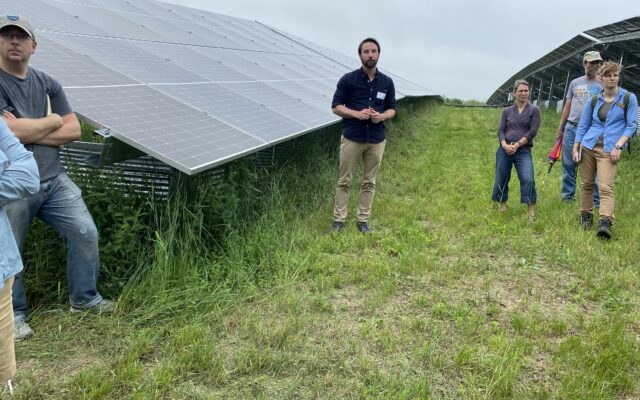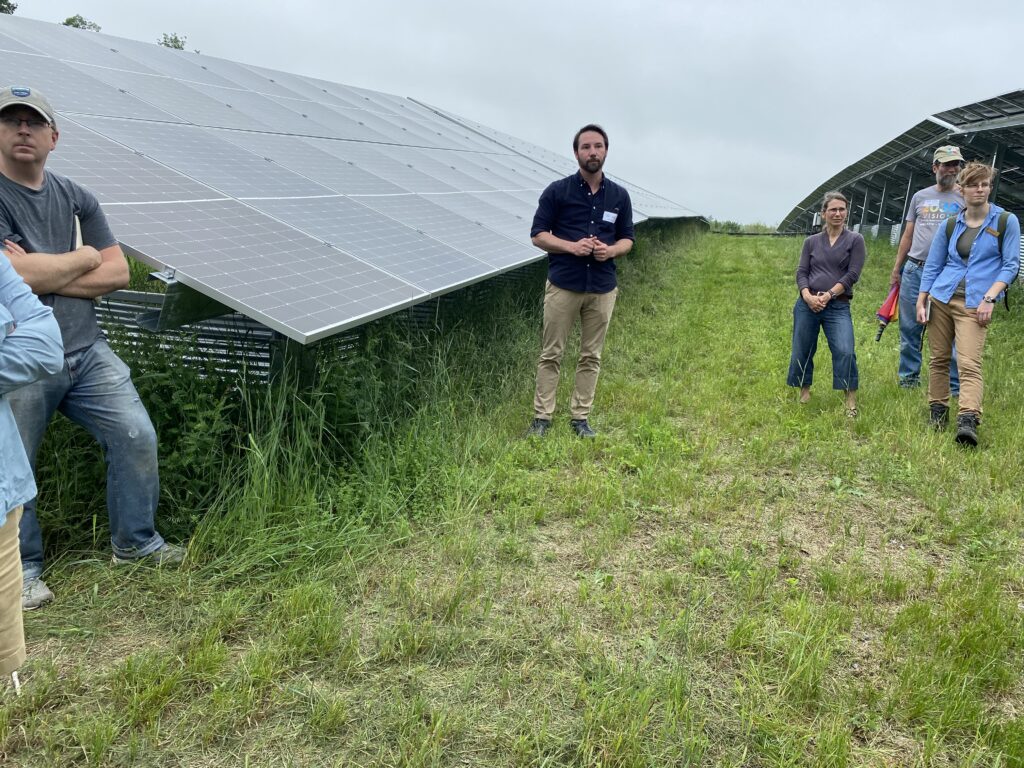
Maine solar farm opens as lawmakers eye curtailing others like it
By Lor Valigra, Bangor Daily News Staff
NORWAY — A 1-megawatt solar farm that will provide electricity to 15 local businesses opened here on June 29, a day after lawmakers debated whether to scale back the incentives that led to it.
New York-based UGE International owns the solar farm, which is built atop a former landfill owned by the western Maine town. The project is part of Maine’s net energy billing program, which was the main reason for the latest round of sharp rate hikes at Central Maine Power and Versant Power.
The opening came at a pivotal time for the industry. Lawmakers debated how to trim the state’s generous solar subsidies, when the House passed an amended bill sponsored by Rep. Steven Foster, R-Dexter, that is backed by Maine’s public advocate and manufacturers.
It would impose limitations on net energy billing projects and customers and require the Maine Public Utilities Commission to adopt rules governing the development of certain solar energy generation projects. That bill has gone to the Senate for consideration, and it is competing with a solar industry-backed bill from Democrats to shave the program slightly.
One provision in the Foster-led bill could eliminate projects like the Norway solar array, Tyler Adkins, chief revenue officer at UGE, said. It says that half of the energy from the project would need to be used onsite. The Norway project sits atop a former landfill that doesn’t consume energy.

SOLAR OPENING — Tyler Adkins of Monson, chief revenue officer at UGE International, answers questions for townspeople who attended the ribbon-cutting of the new solar array in Norway, Maine. Electricity from the array will power 15 local small businesses.
“The bill could eliminate projects like this, so we’re hopeful that the Senate will pick that up and reject that piece of legislation,†Adkins said during the ribbon-cutting ceremony in Norway.
Public Advocate William Harwood said the legislation would not shut down any solar project. The bill directs the Maine Public Utilities Commission to study the amount of the subsidies and propose any adjustments for consideration by the Legislature.
If net energy billing is not reformed, Harwood said, the Norway solar project alone will cost all Maine ratepayers about $100,000 per year.
Adkins questioned how the public advocate arrived at that number for costs. The bill also allows retroactive changes to all net energy billing projects, he said.
“This will make almost all projects unfinanceable as the value of solar credits can be changed at any time by the PUC,” he said.
The project was supposed to go online on June 29, but Adkins is waiting for Central Maine Power to install its meter.
One of nine community solar projects UGE has under development in Maine, the Norway site has 1,962 panels that can collect sunlight on both sides and create power in a smaller space. It sits atop a former town landfill that is now capped. Fifteen small businesses in downtown Norway, including Norway Brewing Co., have signed up to use varying amounts of electricity from the commercial project.
The town also is a customer both in getting power from the solar array and collecting fees for the land it is leasing for the project. UGE will pay $5,000 annually for 20 years, or a total of $100,000 over the project’s life. After 20 years the project could be renewed. The project was a collaboration among the town, UGE and the Center for an Ecology-Based Economy, a local advocacy group focused on education around sustainable technologies.
“We’ve turned this piece of contaminated land into something that will generate lease revenue for the municipality and generate guaranteed savings on electricity bills for businesses for the next 20 years,†Adkins said.
The town has broader ambitions for solar. The project will help local businesses like the Fare Share Food Coop, where electricity has been its biggest bill, Scott Vlaun, executive director of the ecology center, said.
“We’re hoping this is the first step in getting our entire region off of dirty fossil fuels and onto a local energy project,†Vlaun said. “It’s going to help keep a lot of money in our economy and support local jobs.â€
Many of the people working on the project are Mainers, including Adkins, who lives in Monson, northwest of Dover-Foxcroft. UGE also has a rooftop solar project under construction at Foxcroft Academy scheduled to reach commercial operation at the end of this summer.
The project cost about $2.5 million, Adkins said, and it could offset more than 1,000 metric tons of carbon dioxide each year, the equivalent generated by burning around 150,000 gallons of gasoline.
The solar farm got quick approval in the town, which is focused on planning for long-term sustainability, Sarah Carter, a member of Norway’s select board, said.
“Business costs are going up and we are thinking about what the long-term plan looks like for our future generations in Norway,†she said.